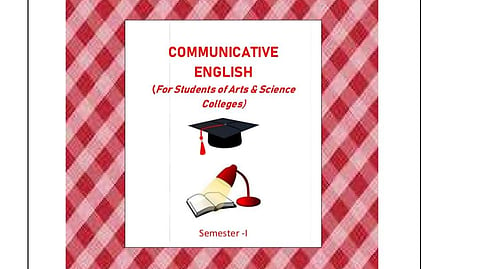

According to some English professors, several parts of an English textbook released about a week ago by the Tamil Nadu State Council for Higher Education (TANSCHE) are allegedly plagiarised and also filled with errors and grammatical mistakes. A few days after the book, ‘Communicative English Book’ for first semester college students in Tamil Nadu was released, the teachers from colleges in the state were shocked to find that when they ran the book under a plagiarism detection service, chunks of the content had apparently been lifted from a wide range of other books and websites.
While the members of the teaching faculty are annoyed by the errors and the plagiarism, what they say is worrying them more is that the book is being made mandatory for colleges across the state, including in autonomous colleges. “Autonomous colleges have been given the power to decide their own syllabus. The English departments in the colleges have to decide what the syllabus is going to be. Then why is it mandatory for them also to teach the book,” a professor who wished to remain anonymous said. “There is a Board of Studies that is the empowered academic body to take such calls. So why should any pressure from ‘above’ be put on what books students are studying?” he asks.
While there is nothing in the way of paperwork, the rumour mills in academic circles are abuzz. “We’ve heard that during a meeting with the VCs, the Higher Education Department complained that students in Tamil Nadu were not speaking good English and thus they themselves would come out with a book for the students, so they can learn how to speak and write well. Firstly, this is insulting, these are dangerous statements to make, students in the state speak well and write well. Of course, there is a lot of room for improvement, but for that, you can’t just introduce any book you want. The VCs have also not protested and are giving in to the pressure,” the professor said. “The book has no author, no index, no references. One has no idea where this material has been taken from? This is a violation at a policy level and a great shame for the state as well,” he added.
The book title’s first page says — ‘English Textbook by Tamil Naadu’ (with that very spelling) and in the following page it states that it is a ‘Communicative English Book’ for Arts and Science Colleges for the first semester. What comes next is even better: The learning tools provided in the Communicative English textbook should prove to be a life-transforming experience for the students entering college and set them on the path to realising their full potential. The confluence of the stakeholders’ motivation and the facilitators’ dedication is bound to produce amazing results, the book states in its preface. “Several parts are from random websites. Instead we can just send these links to the students and ask them to study it. If it is being taught at a UG level doesn’t it need to be referenced and edited properly? It makes teachers like us who have beens thriving so hard feel very bad,” the professor explained. He said his own students first came to him with the allegations and soon various teachers also began to check and found similar errors.
“Taking away the rights of autonomous colleges can be very dangerous. It is threatening to their autonomy. Also, regional sensibility matters, some content can be more relatable for students in hilly regions like Ooty in comparison to the cities. We create content based on regions too, to make it more interesting and enjoyable for students,” he feels.
There are other grievances that the English teachers have about the upcoming academic year, “They want to make soft skills classes also a part of English classes. And even in elective courses, English is being given prominence. They also want to introduce a subject called ‘Professional English’ as a core subject. That would be a violation of the credit system and will create an academic imbalance,” the professor said.
He also claimed that an elective paper called ‘Advanced Tamil ‘ has been removed despite it being a very popular course especially among the non-Tamils. “It essentially denies a student who wants to learn. Courses like Soft Skills help students immensely, to undermine its importance is detrimental to the students.” he believes. “The TANSCHE is like the UGC, it is only supposed to monitor the colleges and see that all policies are being followed. But the TANSCHE has never before produced a textbook, so why did it suddenly decide to do so?” he questioned.
